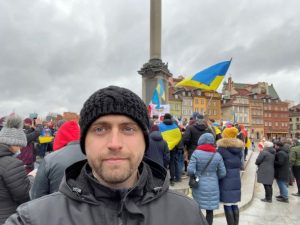Hometown: East Lansing, MI
Current Position: Ph.D. candidate, Department of History, Michigan State University
Professional Interests: Social History, Famine Studies, Aftermaths, Global and Transnational Histories of Ukraine
Webpage: https://history.msu.edu/people/graduate-students/john-vsetecka/
Why did you decide to join the Shevchenko Scientific Society?
I joined the Shevchenko Scientific Society to become part of a robust network of scholars and practitioners that work to promote Ukraine through critical scholarship and dialogue. The Society is crucial for sustaining interest in Ukrainian studies, and I thought it prudent to join as a young scholar so that I can assist in shaping the future of Ukrainian studies with other top researchers in our field.
What do you value about membership in the Society? What is your most memorable Society’s event or publication?
I appreciate that the Shevchenko Society is resilient and forward-thinking. It can be difficult for scholarly societies to remain innovative and on their toes, but I think the Shevchenko Society is doing really admirable work to promote Ukraine to diverse audiences. The recent Expert-a-thon event to raise funds for displaced Ukrainian scholars speaks to this. I found the mini lectures on all aspects of Ukrainian culture, language, history, science, and art to be fascinating. Such a format allowed viewers to consume a great deal of information in an easily digestible format, and I thought it worked well.
How did your interest in Ukrainian culture and society influence your career path?
I first became interested in Ukraine and its history as an undergraduate student at the University of Northern Colorado. I heard a lecture by Dr. Steven Seegel (Shevchenko Society member) on the 1932-33 Holodomor in a history class that he taught at the time, and I was absolutely struck by the details. After the lecture, I remember feeling quite embarrassed that I had never heard about it until that point. I decided to write my undergraduate senior thesis on the Holodomor so that I could research the topic further. When I finished that, I decided that I still was not satisfied with what I knew, so I pursued an MA degree under the supervision of Steven Seegel so that I could write a social history of the Holodomor based on the experience of survivors, which I found lacking in the literature at the time.
It turned out that an MA did not cure my interest either. Now, I am now finishing my PhD on the Holodomor at Michigan State University under the supervision of Dr. Matt Pauly (also a Shevchenko Society member), and I hope to defend in the spring of 2023. As it turned out, one lecture would help shape my entire career trajectory, and I have been studying Ukraine ever since. I hope that I can continue to teach and research Ukraine so that I can put the country on students’ mental maps as they make their way through their university years. One college lecture on Ukraine changed my life, and I think that it could do the same for many others.
What is your current research/work project?
My dissertation, “In the Aftermath of Hunger: Rupture, Response, and Retribution in Soviet Ukraine, 1933-1947,” is a history of the aftermath of the 1932-33 Holodomor and the 1946-47 famine. In short, my project examines the issues and problems left in the wake of the 1932-33 famine and how they reverberated both inside and outside of Ukraine following the famine’s conclusion. Unlike most literature on the Holodomor, my study begins in 1933 rather than ending there. I do this to show that while mass starvation largely ended in 1933, the famine’s effects did not, and survivors continued to deal with the consequences of hunger for years to come. My project examines some of these problems in order to detail how Ukrainians struggled to come to terms with the famine in the years immediately following its conclusion. In addition to drawing inspiration from a wide range of historical studies on the ‘aftermath,’ I remember being particularly enamored with the edited volume After the Holodomor: The Enduring Impact of the Great Famine on Ukraine (edited by Shevchenko Society President, Halyna Hryn, among others), which first got me thinking about the legacies of 1932-1933. It is my hope that my dissertation will become a book once it is finished.
Also in the pipeline are two other projects: one related to the Holodomor and one not. After I finish my dissertation, I hope to resume work on a book-length project on the U.S. Commission on the Ukraine Famine and its role in promoting global awareness of the Great Famine in the 1980s. Additionally, I hope to begin work on another manuscript focused on the Kurenivka Tragedy that took place in Kyiv in 1961 when a mudslide came down from Babyn Yar and inundated the Kurenivka district below.
In addition to my scholarship, I am busy doing humanitarian work with an organization called forPeace that is helping to support Ukraine during the ongoing war. After I was evacuated out of Kyiv in late January 2022 during my Fulbright research year, I moved to Warsaw, Poland where I, along with my friends, began assisting those Ukrainians who were forced to flee their country as a result of Russia’s war on Ukraine. Our small group transformed into forPeace’s Ukraine Relief Project, and we have been supplying critical humanitarian and medical aid to Ukraine ever since.
What career advice would you give for new members of the Shevchenko Scientific Society?
As a new member to the Society, I find the events and networking to be useful resources. Anyone who joins the Shevchenko Society should reach out to others, learn about the exciting work that is taking place, and collaborate on projects. It is, in my opinion, crucial to get involved in the societies and organizations in one’s discipline, so I encourage new members to utilize all of the resources and people that the Shevchenko Scientific Society has to offer.

